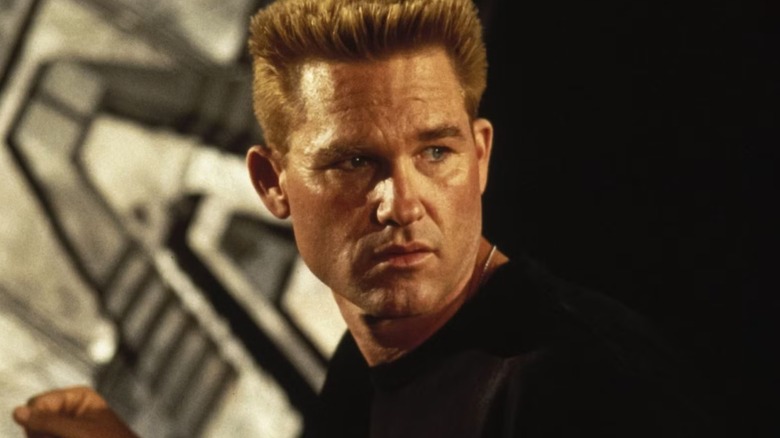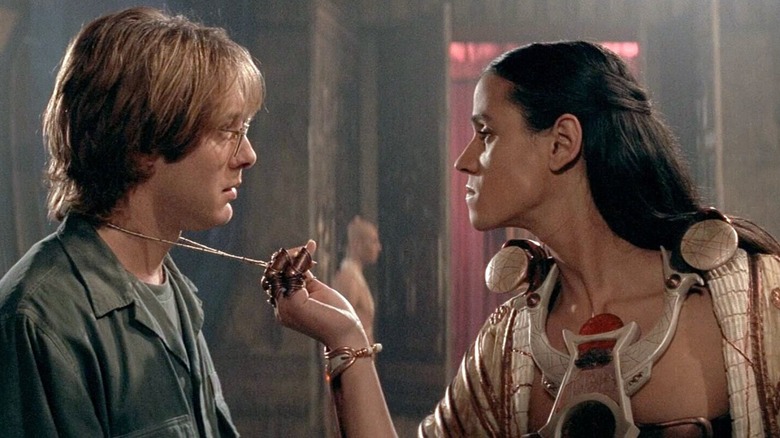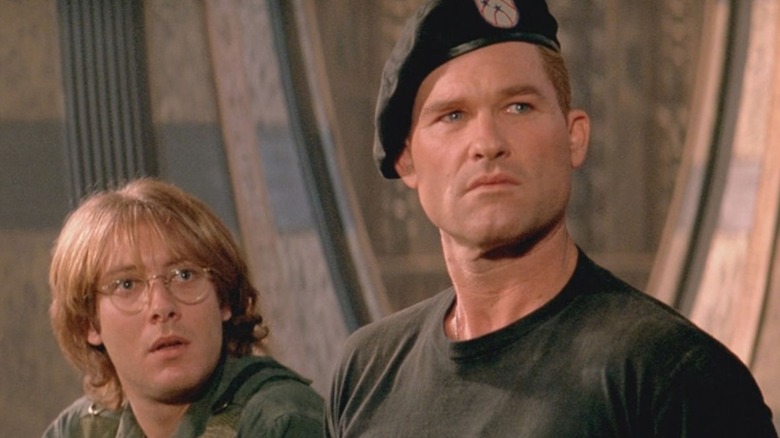I Watched The Original Stargate Movie For The First Time - Here Are My Brutally Honest Thoughts
This post contains major spoilers for "Stargate."
Whenever a character in a sci-fi setting talks about intergalactic civilizations or primordial entities, I tend to lock in immediately. After all, a good space adventure promises fantastical revelations, suspending disbelief just the right amount while grounding the story with a smattering of logic. Now, there are variations to this instinct, as some sci-fi stories tend to be more vivid and imaginative than others, but the average, trope-heavy genre offering can also be a lot of fun.
The latter perfectly sums up Roland Emmerich's "Stargate," the 1994 sci-fi epic that opened in theaters to overwhelming financial success (grossing $196 million worldwide!) and negative-to-lukewarm critical reception. Watching "Stargate" for the first time can be a bit disorienting, especially with the foreknowledge that the film inadvertently launched a beloved franchise that flourished for decades, developing an ethos distinctly different than Emmerich's original.
Full disclosure: I watched "Stargate" after binge-watching "Stargate SG-1" and "Stargate Atlantis," two sequel shows that I sincerely adore due to the eccentric ingenuity they bring to the sci-fi space. Diving into Emmerich's film while already being armed with this grander contextual framework has definitely impacted my viewing experience, but it also invested "Stargate" with a depth that a standalone viewing doesn't offer. This might also explain why most critical reactions during the film's release describe it as hollow or vacant, where even the most bombastic events unfurling onscreen lack any substance.
That said, the consensus is that Emmerich's tendency to lean into dramatic, sentimental theatrics pays off in this instance, compounded by the fact that a competent James Spader and Kurt Russell do most of the heavy lifting to sell this ridiculous premise. Without further ado, these are my honest thoughts about "Stargate," which can only be described as a bumpy joyride that often makes some curiously baffling turns.
Stargate is a lot more enjoyable if you play along with its tongue-in-cheek sensibilities
A group of archeologists excavates a giant stone artifact and a metallic ring in "Stargate," and the dunes of Egypt provide some vague cultural context to the central MacGuffin that is dug up. We quickly learn that these artifacts fit together to activate something called a Stargate, a device that can instantaneously transport you from one part of the galaxy to another. Pseudo-scientific mumbo-jumbo is used to explain the intricacies of the device, but this oversight is thankfully rectified in the franchise entries to come, which effectively muddle the Stargates' MacGuffin status.
The device is brought to a secret military base for activation, where a disgruntled Colonel Jack O'Neil (Kurt Russell) eyes the awkward, gifted linguist Daniel Jackson (James Spader) with barely-concealed disdain. There's no particular reason as to why the military officers don't take Daniel (who is the only historian on their team, by the way) seriously, except for a vapid "Oh my God, nerd alert!" sentiment played purely for laughs. So when Jack and his team get stuck on Abydos, they ignore Daniel's warnings, rolling their eyes when he suggests that establishing contact with the local populace is their only way out. One unexpected sandstorm later, Daniel is proven right, and we are quickly introduced to the welcoming desert-dwellers and their cruel, despotic god, Ra (Jaye Davidson).
This is when the film unapologetically embraces its whimsical nature, as the most outlandish things happen one after the other, and it is best to simply go with the flow. Ra's motivations seem almost comically evil as an alien pretending to be an Egyptian deity, but Davisson plays the character with such passionate panache that it's easy to overlook that. There's also some misogynistic nonsense going on with the tribe's chieftain offering his daughter, Sha'uri (Mili Avital), as a "gift" to Daniel, but the ickiness of the moment is balanced out once the two organically fall in love. There's a streak of corniness present in both the action and romance that unravels here on, but it is so enjoyable that none of these flaws get in the way of the "Stargate" experience.
Stargate establishes an iconic character team-up that has now become a franchise cornerstone
If you've watched "Stargate SG-1," you'll notice that Richard Dean Anderson's Jack O' Neill (note the extra "l") is nothing like Kurt Russell's character, as the former brings sincere levity to the crew's interpersonal dynamics and doesn't sulk as much. Russell's iteration is more sarcastic, his dry humor cutting through the humdrum of clichéd action sequences set in the desert, perfectly balanced against Daniel's warm bravado as an unconventional heroic figure.
While Daniel uses his wit to outsmart Ra, Jack brute-forces his way through the guards, yelling, "Give my regards to King Tut, a**hole!" as he kills Ra's right hand, Anubis. Mind you, there's nothing extraordinary about this sequence from a technical standpoint, but Russell's mere presence is enough to imbue it with a campy humor that works well with the film's shenanigans.
The Jack O' Neil and Daniel Jackson team-up is one of the highlights of "Stargate," and it pays off so well that it becomes the crux of "Stargate SG-1," where this foundational friendship allows every other dynamic to bloom around it. By the end of the film, Jack seems more gentle and approachable, while Daniel takes inspiration from the Colonel's no-nonsense bravery and pushes himself to step up when the occasion demands it. The existence of "SG-1" enriches this budding dynamic, etching a robust, transformative arc for both Jack and Daniel, who evolve into complex franchise characters over time.
It is also a joy to watch Davidson ham it up as Ra, as this character is granted a convoluted backstory in "SG-1" alongside Anubis, who emerges as a twisted, conniving System Lord in the series. The rest is a mix of questionable dialogue, a heavy use of SFX that feels impressive for its time, and an authentic effort to recreate Ancient Egypt and its historical threads by going the extra mile. The results aren't perfect, but I enjoyed "Stargate" for what it is: A semi-serious space adventure that constantly winks at genre audiences and has a gala time while doing so.


